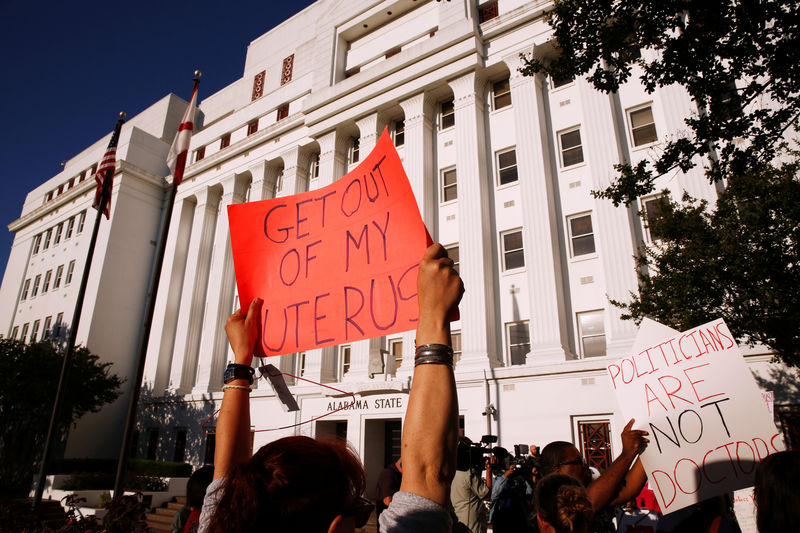By Daniel Trotta
(Reuters) - Anti-abortion advocacy groups have pushed hard in recent months for the passage of bills to restrict or even ban the procedure outright at the state level, inspired by the perception that the U.S. Supreme Court has tilted in their favor.
Anti-abortion campaigners have been seeking to overturn a woman's constitutional right to an abortion ever since the U.S. Supreme Court found they had that right in the 1973 decision Roe v. Wade.
The momentum has picked up since Republican President Donald Trump appointed two justices to the nine-member Supreme Court in the past two years.
State legislatures with Republican majorities are passing laws they know will face legal challenge, hoping the Supreme Court will eventually decide to hear one that could overturn Roe.
In Alabama, Republican legislators on Tuesday took the most extreme position yet of any state, banning nearly all abortions and only allowing exceptions to protect the mother's health. Governor Kay Ivey signed it into law on Wednesday.
Republican Senator Clyde Chambliss, arguing in favor of the Alabama bill, said the whole point was "so that we can go directly to the Supreme Court to challenge Roe versus Wade."
Other activists have the same strategy.
"From the beginning we have always kept a goal in mind and that is the Supreme Court," said Janet Porter, president of Faith2Action, a Christian organization that has successfully promoted "heartbeat" bills outlawing abortion once a doctor can detect embryonic cardiac activity, which occurs as early as six weeks after conception.
"There's been a shift. This is the year America went from regulating abortion to ending it," Porter said.
Just this year, four states have passed "heartbeat" bills. They are among 15 states that have introduced six-week bans this year, according to the Guttmacher Institute, an abortion rights group. Three other states passed similar laws in previous years, Porter said.
MODEL LEGISLATION
Anti-abortion groups have turned to so-called model legislation that can be copied and modified for multiple states.
The National Right To Life Committee has supported laws in 15 state laws that ban abortions when the fetus can feel pain, 12 that ban dismemberment abortion and eight that require informing a woman she can reverse course after taking the first of two abortion pills, Executive Director David O'Steen said.
But O'Steen cautioned against depending too much on Supreme Court action. Supreme Court precedent is rarely overturned, so it would be remarkable if the court even decided to hear a case that could challenge Roe.
"Any speculation as to what the court will do on any particular bill at this time is purely that - speculation," O'Steen said.
Abortion rights groups are relying on the Supreme Court's respect for precedent and say their main focus is on getting lower courts to stop laws such as those passed in Alabama and Georgia.
"It's going to be some time before the court even addresses that question. We should be worrying about what's going on right now. Right now, states are regulating abortion out of reach," said Talcott Camp, deputy director of the American Civil Liberties Union Foundation's Reproductive Freedom Project.
Porter applauded the Alabama law, saying it was better than her heartbeat bill. But she said the heartbeat bill was designed in part to challenge Roe, which guarantees a woman's right to an abortion prior to the "viability" of the fetus to survive outside the womb.

The High Court found viability was usually 28 weeks "but may occur earlier, even at 24 weeks." Porter is hoping for a new interpretation that establishes the heartbeat as the standard.